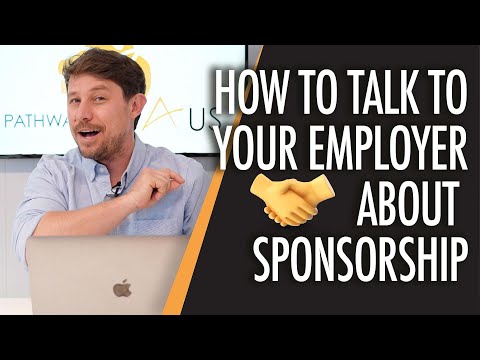How to Talk to Your Employer About Sponsorship
We often hear from applicants who are unsure about how to approach their employers regarding sponsorship. It can indeed be a challenging conversation, but this guide will give you some pointers on how to navigate it effectively.
Know Your Facts
Before you approach your employer, make sure you have a clear understanding of the following:
- Types of Visas: Be knowledgeable about the different types of visas available, such as Training, 482, and 186 visas. Determine which one is most suitable for your situation.
- Occupation Eligibility: Check if your occupation is eligible for sponsorship and identify which occupation list it is on.
- Requirements: Familiarise yourself with the requirements for both the applicant and the sponsor. This includes qualifications, experience, and other criteria.
- Salary Requirements: Know the minimum salary you must earn to be eligible for the visa.
- Documentation: Prepare a list of documents that must be provided by both you and the employer.
Know the Costs
Understanding the financial aspects of the sponsorship process is crucial:
- Cost Breakdown: Know the costs associated with each step of the process.
- Payment Responsibilities: Clarify who is responsible for paying which costs (you or the employer).
- Payment Timing: Be aware of when each payment is due.
Timing and Lodging
Timing is essential in the sponsorship process:
- Advertising: Know when you need to place adverts for the position.
- Lodging Steps: Be clear about the timeline for lodging each step of the application process.
- Give Time: Allow your employer ample time to process and understand your request; don’t rush them.
Benefits to the Employer
Highlighting the benefits to the employer can make your case stronger:
- Filling Skill Gaps: Emphasise how your skills fill a much-needed gap within the company.
- Retention Risks: Discuss the potential impact on the company if you leave or if they cannot fill the role.
- Loyal Workforce: Explain how sponsored employees are often more loyal, reducing recruitment and training costs over time.
- Easier Future Sponsorships: Point out that once the company has gone through the sponsorship process once, it becomes easier for them to sponsor employees in the future.
As part of the immigration’s migration strategy, a new skills in demand visa will be introduced. The new Skills in Demand Visa is a four-year temporary skilled worker visa that allows workers greater flexibility to change employers and provides clear pathways to permanent residency. Replacing the standard 482 Employer Sponsored Visa, this visa will enable individuals with high-demand skills to be sponsored by Australian employers.
By thoroughly preparing and understanding both the requirements and benefits, you can approach your employer with confidence and clarity.




